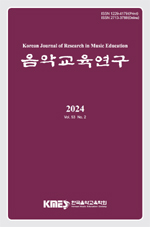본 연구의 목적은 국내의 교양 음악교육의 실태 분석 및 향후 교육의 방향을 제시하는 것이다. 이를 위해 전국 4년제 일반종합대학 40교를 대상으로 2023년 교육과정, 교수요목, 수업계획서를 수집하여 총 225개의 교양 음악과목을 분석하였다. 분석 결과, 운영 면에서 음악학과(61.78%), 음악학과가 없는 경우 교양대학(23.11%)에서 주관하였다. 과목유형은 자유교양(41.33%), 영역배분과목(47.56%)이 많고, 예술 또는 인문학과 관련된 영역명을 사 용했다. 강의내용과 방법은 음악단독-이론(68.21%), 음악단독-실기(31.79%), 융합-이론(30.39%), 융합-실기(9.62%) 순이었다. 음악단독 강의주제는 이론으로는 음악사, 실기로는 가창이나 기악연주에 집중되어 있고 융합강의는 인 문학과의 융합이 많았다. 이를 바탕으로 교양 음악교육의 독립성을 위한 전문 교원 확보, 양질의 다양한 음악 단독 및 융합과목을 연구, 개발할 것을 제안하였다.
This study aims to assess music liberal arts education in South Korea and suggest future directions. To achieve this, 40 of 4-year universities across the country were selected, and the curriculum, class objectives, and course plans for the year 2023 were collected and analyzed. As a result of the analysis, in terms of operation, the music department accounted for 61.78%, while the college of Liberal Arts accounted for 23.11%. As for the types of subjects, there were general education courses (41.33%) and distribution requirement courses (47.56%), and names of areas related to art or humanities were used. Content and method of lectures were categorized as follows: music theory lectures (68.21%), music applied lessons (31.79%), music convergence theory lectures (30.39%), and music convergence applied lessons (9.62%). While music lectures emphasized history, singing, and instruments, convergence lectures emphasized humanities. The proposal suggests securing professional lecturers to enhance liberal arts music education autonomy and developing diverse, high-quality music and convergence subjects.
Ⅰ. 서론
Ⅱ. 분석 방법
Ⅲ. 연구 결과
Ⅳ. 결론 및 제언
References
(0)
(0)
